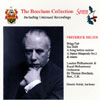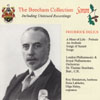Beecham conducts Delius
Beecham in the music of two composers for whom he had especial affection, much of which is heard here for the first time
View record and artist detailsRecord and Artist Details
Composer or Director: Frederick Delius
Label: Somm Recordings
Magazine Review Date: 3/2001
Media Format: CD or Download
Media Runtime: 75
Mastering:
Mono
ADD
Catalogue Number: SOMM-BEECHAM10

Tracks:
| Composition | Artist Credit |
|---|---|
| Brigg Fair (An English Rhapsody) |
Frederick Delius, Composer
(Anonymous) Orchestra Frederick Delius, Composer Thomas Beecham, Conductor |
| On hearing the first cuckoo in Spring |
Frederick Delius, Composer
Frederick Delius, Composer Royal Philharmonic Society Orchestra Thomas Beecham, Conductor |
| (A) Village Romeo and Juliet, Movement: Interlude The Walk to the Paradise Garden |
Frederick Delius, Composer
Frederick Delius, Composer Royal Philharmonic Society Orchestra Thomas Beecham, Conductor |
| Sea Drift |
Frederick Delius, Composer
Dennis Noble, Baritone Frederick Delius, Composer London Symphony Orchestra Manchester Beecham Opera Chorus Thomas Beecham, Conductor |
| North Country Sketches, Movement: Autumn |
Frederick Delius, Composer
Frederick Delius, Composer London Philharmonic Orchestra Thomas Beecham, Conductor |
| North Country Sketches, Movement: Winter Landscape |
Frederick Delius, Composer
Frederick Delius, Composer London Philharmonic Orchestra Thomas Beecham, Conductor |
| (A) Song before sunrise |
Frederick Delius, Composer
Frederick Delius, Composer London Philharmonic Orchestra Thomas Beecham, Conductor |
| (A) Dance Rhapsody No. 2 |
Frederick Delius, Composer
Frederick Delius, Composer London Philharmonic Orchestra Thomas Beecham, Conductor |
Composer or Director: Frederick Delius
Genre:
Orchestral
Label: Somm Recordings
Magazine Review Date: 3/2001
Media Format: CD or Download
Media Runtime: 74
Catalogue Number: SOMM-BEECHAM8

Tracks:
| Composition | Artist Credit |
|---|---|
| Arabesque |
Frederick Delius, Composer
Frederick Delius, Composer London Select Choir Roy Henderson, Baritone Thomas Beecham, Conductor |
| (Eine) Messe of Lebens (A Mass of Life) |
Frederick Delius, Composer
Frederick Delius, Composer |
| Songs of Sunset, Movement: A Song of the Setting Sun |
Frederick Delius, Composer
Frederick Delius, Composer London Philharmonic Orchestra London Select Choir Olga Haley, Mezzo soprano Roy Henderson, Baritone Thomas Beecham, Conductor |
| Songs of Sunset, Movement: Cease smiling, Dear! |
Frederick Delius, Composer
Frederick Delius, Composer London Philharmonic Orchestra London Select Choir Olga Haley, Mezzo soprano Roy Henderson, Baritone Thomas Beecham, Conductor |
| Songs of Sunset, Movement: Pale amber moonlight |
Frederick Delius, Composer
Frederick Delius, Composer London Philharmonic Orchestra London Select Choir Olga Haley, Mezzo soprano Roy Henderson, Baritone Thomas Beecham, Conductor |
| Songs of Sunset, Movement: Exceeding sorrow |
Frederick Delius, Composer
Frederick Delius, Composer London Philharmonic Orchestra London Select Choir Olga Haley, Mezzo soprano Roy Henderson, Baritone Thomas Beecham, Conductor |
| Songs of Sunset, Movement: By the sad waters of separation |
Frederick Delius, Composer
Frederick Delius, Composer London Philharmonic Orchestra London Select Choir Olga Haley, Mezzo soprano Roy Henderson, Baritone Thomas Beecham, Conductor |
| Songs of Sunset, Movement: See how the trees |
Frederick Delius, Composer
Frederick Delius, Composer London Philharmonic Orchestra London Select Choir Olga Haley, Mezzo soprano Roy Henderson, Baritone Thomas Beecham, Conductor |
| Songs of Sunset, Movement: I was not sorrowful |
Frederick Delius, Composer
Frederick Delius, Composer London Philharmonic Orchestra London Select Choir Olga Haley, Mezzo soprano Roy Henderson, Baritone Thomas Beecham, Conductor |
| Songs of Sunset, Movement: They are not long, the weeping and the laughter |
Frederick Delius, Composer
BBC Chorus Frederick Delius, Composer Nancy Evans, Contralto (Female alto) Redvers Llewellyn, Baritone Royal Philharmonic Orchestra Thomas Beecham, Conductor |
| I-Brasil |
Frederick Delius, Composer
Dora Labbette, Soprano Frederick Delius, Composer London Philharmonic Orchestra Thomas Beecham, Conductor |
| (2) Songs, Movement: Le ciel est pardessus le toit |
Frederick Delius, Composer
Dora Labbette, Soprano Frederick Delius, Composer Thomas Beecham, Piano |
| (7) Songs from the Norwegian, Movement: Cradle Song (wds. H. Ibsen) |
Frederick Delius, Composer
Dora Labbette, Soprano Frederick Delius, Composer Thomas Beecham, Piano |
| (7) Danish Songs, Movement: Irmelin Rose (wds. J. P. Jacobsen) |
Frederick Delius, Composer
Dora Labbette, Soprano Frederick Delius, Composer Thomas Beecham, Piano |
| (7) Songs from the Norwegian, Movement: Sweet Venevil (wds. B. Bjørnson) |
Frederick Delius, Composer
Dora Labbette, Soprano Frederick Delius, Composer London Philharmonic Orchestra Thomas Beecham, Conductor |
| (5) Songs from the Norwegian, Movement: The Nightingale (wds. J. S. C. Wellhaven) |
Frederick Delius, Composer
Dora Labbette, Soprano Frederick Delius, Composer Thomas Beecham, Piano |
| (7) Songs from the Norwegian, Movement: Evening Voices, or Twilight Fancies (wds. B. Bjö |
Frederick Delius, Composer
Dora Labbette, Soprano Frederick Delius, Composer Thomas Beecham, Piano |
| (2) Danish Songs, Movement: The Violet |
Frederick Delius, Composer
Dora Labbette, Soprano Frederick Delius, Composer Thomas Beecham, Piano |
| (2) Danish Songs, Movement: Autumn (Whither?) |
Frederick Delius, Composer
Dora Labbette, Soprano Frederick Delius, Composer London Philharmonic Orchestra Thomas Beecham, Conductor |
Author: kYlzrO1BaC7A
Far more than any rival, Beecham conveys a virile thrust and energy in the writing, partly opting for faster speeds. Thanks to Beecham’s magnetism arguments have a tautness that can otherwise seem to ramble. Both in this, with its seven linked sections, and in the single span of An Arabesk, a setting of Jens Peter Jacobsen in Philip Heseltine’s translation, the line of the argument is clarified. Roy Henderson is the clean-cut, sensitive baritone soloist in both, sounding very English, with Olga Haley a fresh, bright mezzo soloist in the Songs of Sunset.
What has no doubt prevented this inspired reading of the Songs of Sunset from being issued before is that the test pressing of the final climactic section is missing. So, to have the work complete, that final ensemble for soloists and chorus together is included here in the studio recording which Beecham made for HMV in 1946, but which he rejected. With Nancy Evans and Redvers Llewellyn as soloists, it makes an excellent conclusion, with the chorus more clearly focused than its predeccessor in 1934. What matters is that the choral sound in both has ample weight. An apology is given for the noisy surfaces at the ends of 78 sides, but the full- bodied transfer makes that flaw easy to ignore.
Dora Labbette is the enchanting soprano soloist in all the separate songs, bright and silvery, attacking even the most exposed high notes with astonishing purity and precision, producing magical pianissimos. Four of the 10 come in the beautiful orchestral versions, with the rest accompanied at the piano by Beecham himself. He may not have been the most accomplished pianist, but his natural magnetism still shines out, not least in the striking early song, longer than the rest, Twilight Fancies.
The disc of Beecham’s arrangements of Handel is just as distinctive, always elegant and warmly expressive. He defies latterday taste if anything even more radically than Stokowski in his arrangements of Bach, yet is similarly winning. The 10 movements from the ballet, The Origin of Design, come from the very first recording sessions of Beecham’s newly founded London Philharmonic in December 1932. The following month he re-recorded three of the movements (available on Dutton, 1/97), but extraordinarily this far bigger selection of movements was never issued – brilliantly performed, with the players on their toes, not least the soloist Leon Goossens. Sadly the 78 side containing the ‘Serenade’ is so damaged that the opening of the movement has had to be omitted.
Seven of the movements from the later ballet,
The oddity is the four-movement Piano Concerto which Beecham cobbled together from various Handel movements (unidentified here) for his then-wife, the pianist Betty Humby. It makes a curious confection, starting with a nine-minute ‘Chaconne’ in which grandly spacious sections punctuate energetic chaconne variations.
The result is energetic, sounding less like Handel than 20th-century pastiche, with keyboard figuration and pianistic tricks unashamedly reflecting the romantic concerto tradition. As in the Delius disc, transfers bring satisfyingly full-bodied sound, if with obvious limitations. What is clear throughout is the Beecham magic – wonderful control of phrasing and rhythm in performances that are light of touch and full of fun.'
Discover the world's largest classical music catalogue with Presto Music.

Gramophone Digital Club
- Digital Edition
- Digital Archive
- Reviews Database
- Full website access
From £8.75 / month
Subscribe
Gramophone Full Club
- Print Edition
- Digital Edition
- Digital Archive
- Reviews Database
- Full website access
From £11.00 / month
Subscribe
If you are a library, university or other organisation that would be interested in an institutional subscription to Gramophone please click here for further information.




